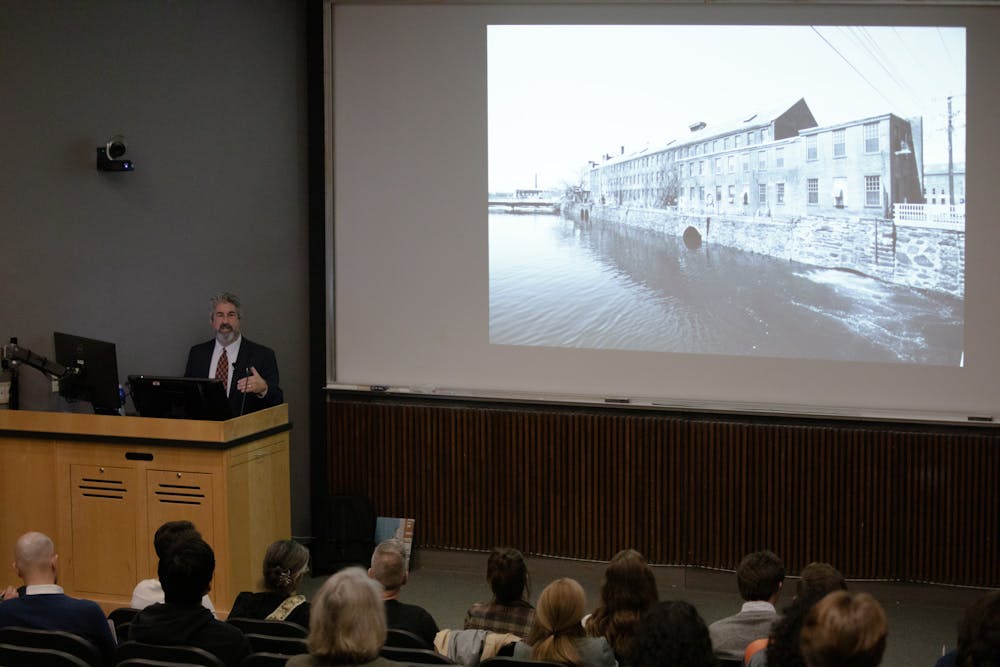Max Page, Rome Prize winner and University of Massachusetts Amherst professor of architecture and history, traveled to Grounds Monday for an event hosted by the School of Architecture, titled “Why Preserving Difficult Places Matters.” Page talked about how controversial places can be used as tools for societal advancement and progress in the United States.
Page is a Guggenheim Fellow recipient and the current President of the Massachusetts Teachers Association. Throughout his career, he has authored and edited many books and publications regarding cities, architecture and historic preservation.
One major theme of the lecture was how important the preservation and interpretation of historic sites is for facing often difficult histories in order to chart a more equitable future. In an interview after the lecture, Page said that preserving divisive locations even contributes to sustaining a democracy.
“Very simply, preserving and interpreting places of great controversy and pain is really important to a healthy democracy,” Page said.
Page also spoke to the removal of statues commemorating Confederate leaders, including the recent removal and melting of the Robert E. Lee statue in Charlottesville that was the center of the fatal “Unite the Right” rally in 2017.
Page went on to speak about the Memorial to Enslaved Laborers on Grounds and how significant the site is. The memorial, dedicated in 2020, is meant to honor the lives and legacies of enslaved laborers who built the University.
“There’s something very powerful about [the memorial] because it reminds us of a simple fact…which is that slavery is fundamentally a system of labor exploitation that used the oppression of black people in order to profit from their labor,” Page said.
Around 75 people attended the lecture in Campbell Hall, including Andrew Johnston — director of the University program in historic preservation, an interdisciplinary certificate for the School of Architecture masters degree candidates — who introduced Page.
Page also discussed how local communities in Richmond are still considering how to repurpose sites such as Monument Avenue and Shockoe Bottom, the largest location where enslaved peoples were bought and sold in the United States in the 19th century.
Page said that he — along with three of his graduate students — have considered various ideas on how to transform Shockoe Bottom in order to not only memorialize the dark history, but also to contribute to the advancement of the city today.
“One of the ideas was to have a memorial park to remember and honor the ancestors…but we also wanted to make this a place of new economic revitalization,” Page said. “Virginia Union University was founded in a building on that site. We felt like ‘let’s bring education back,’... to not just have it be a memorial site but actually be part of the revitalization of the city.”
Page said that he and his students thought of how to replace Monument Avenue with a new set of monuments of key African American individuals in the city's history. However, he also mentioned that although he personally believes that the removal of statues is the right decision, he still worries about the implications of these actions.
The audience, consisting primarily of Architecture students and faculty, raised numerous questions at the end of the lecture concerning topics such as virtual preservation as well as whether preservation does more harm than good to the descendents of affected communities.
One audience member asked what may happen when a community decides the preservation of a historic site is no longer necessary. Page answered that although this is uncommon, if there are economic reasons behind this decision, they are unfounded.
“We have very weak laws on preservation in this country, and so actually demolition is not usually stopped,” Page said. “There’s an argument that preservation stands in the way of affordability because it stops development that will naturally produce affordable housing, and I think it’s false.”
Page also spoke on how preservation of old architecture can play a large role in the climate fight, however that architects must be more flexible in adaptive reuse of old buildings to effectively and meaningfully contribute to combating climate change.
“We need to preserve our way out of the climate crisis,” Page said. “But we have to be willing to adapt in order to be climate resilient.”







